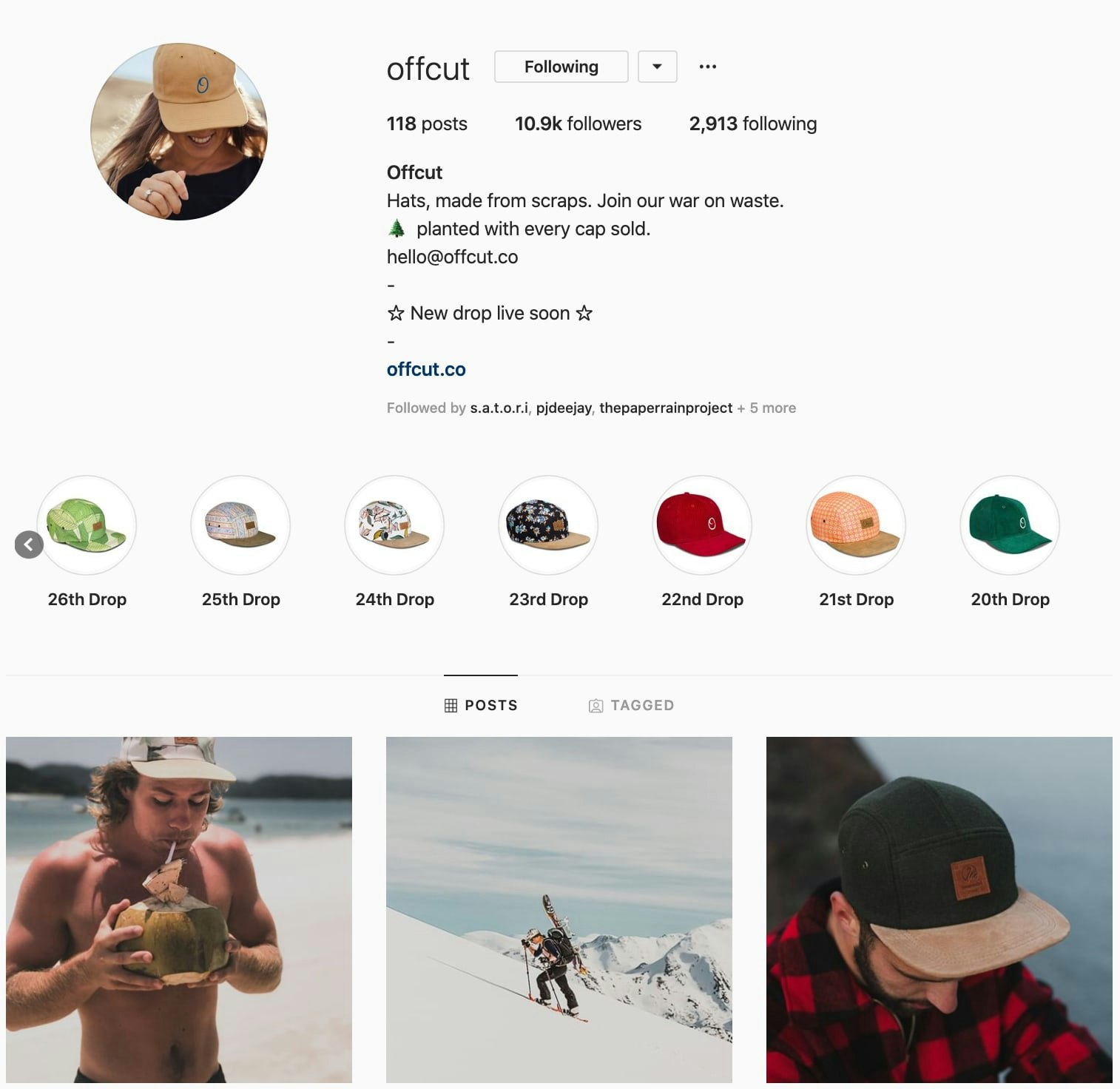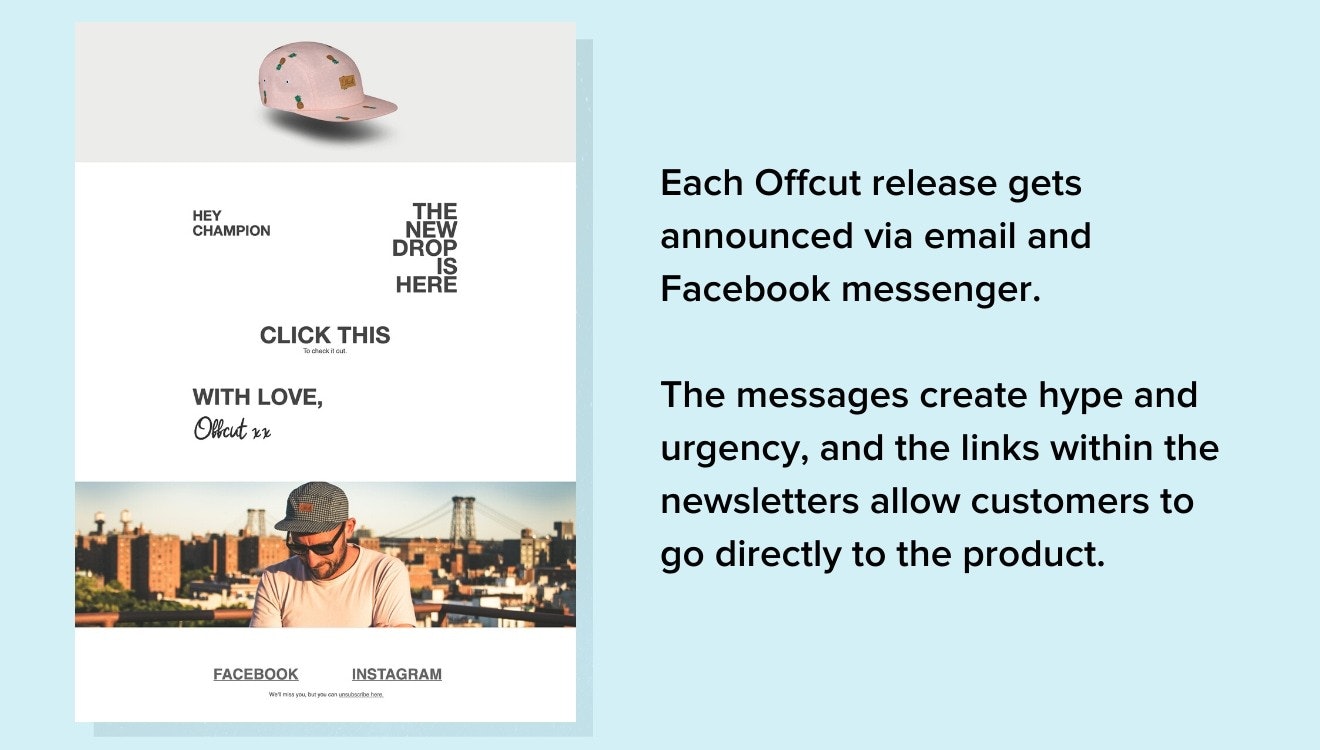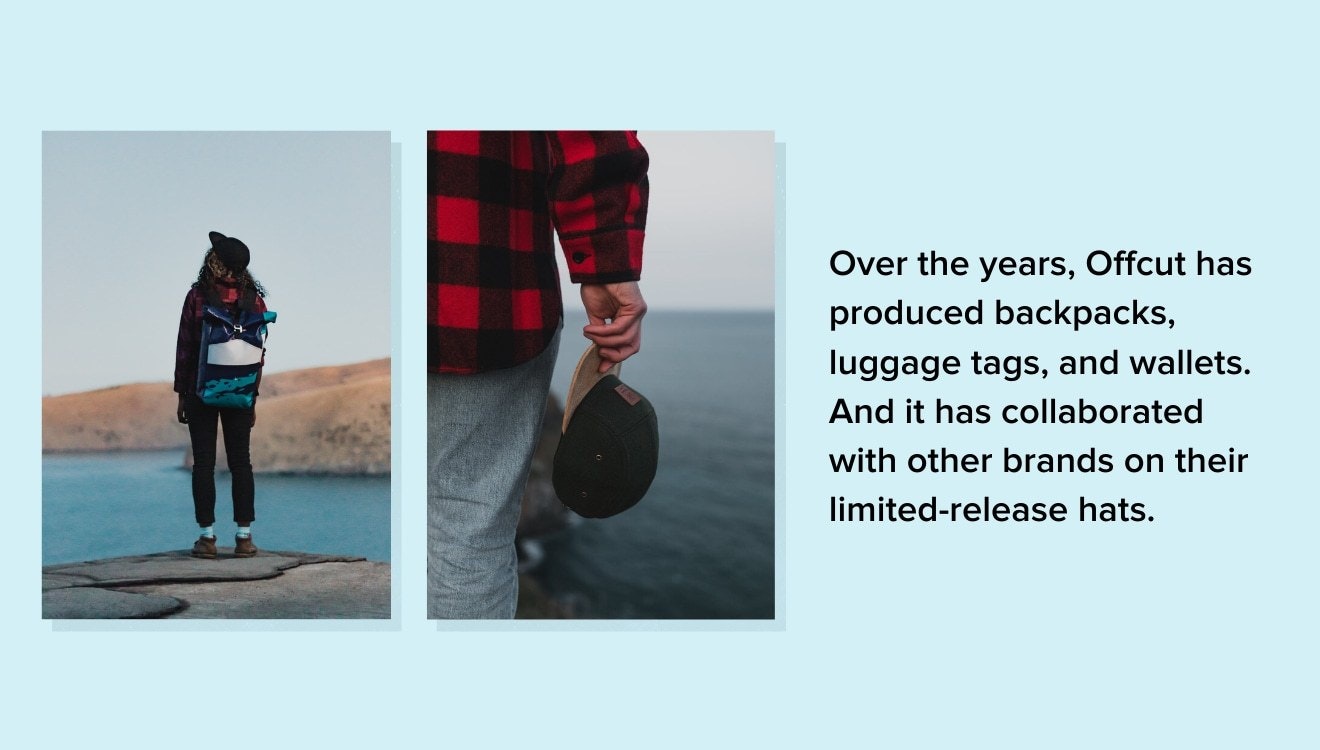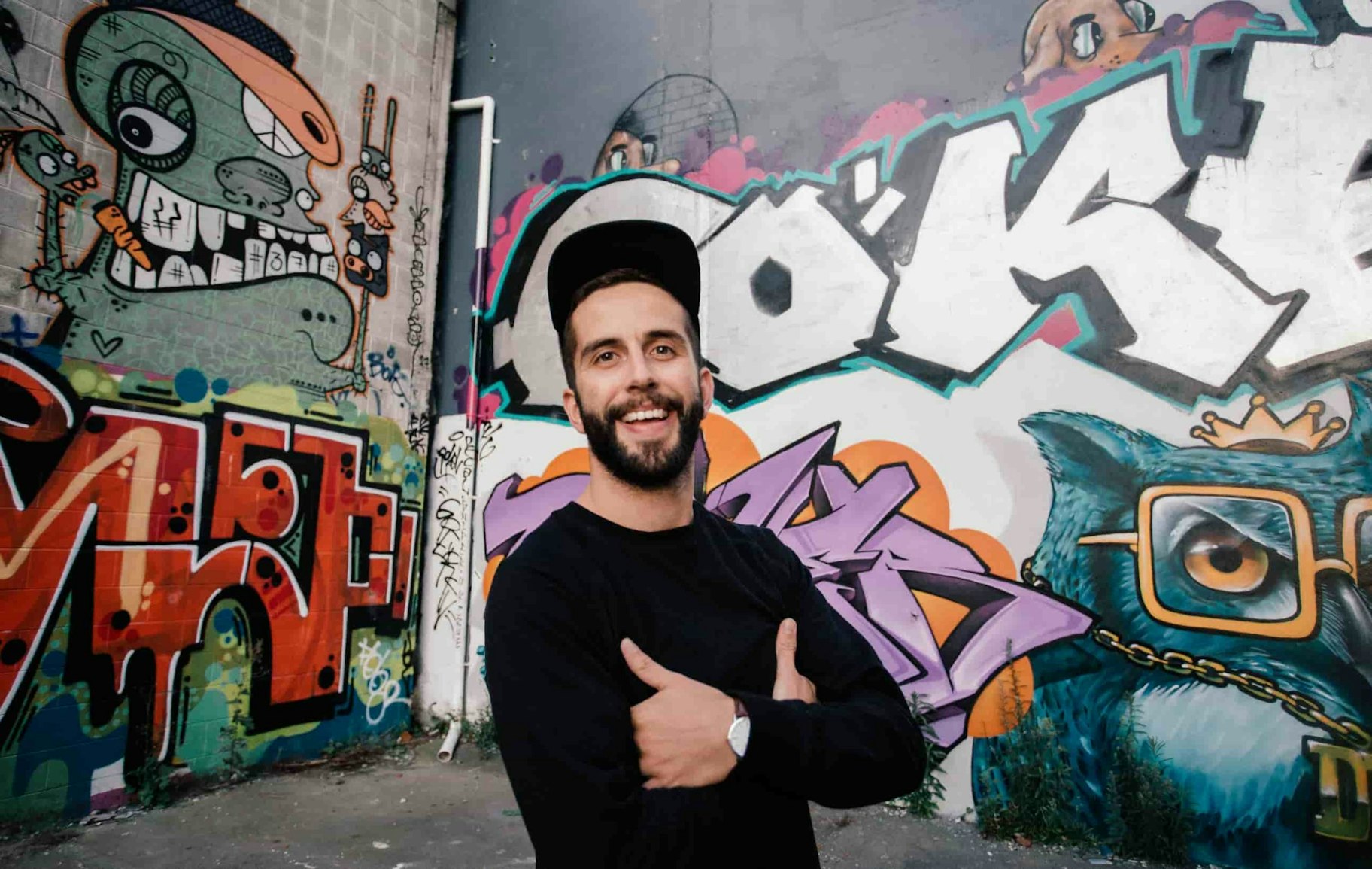The humble curtain might not seem like your standard source of inspiration, but for Adrien Taylor, it helped spark an idea that quickly developed into his New Zealand-based company, Offcut.
Adrien was visiting his father’s curtain warehouse when he noticed a room filled with off-cut fabric and asked what happened with the remaining pieces.
The fabric was brand new, but because a curtain manufacturer has no use for the smaller sections of material, the vast majority of it was destined for landfill.
Thinking it seemed strange to throw away perfectly good fabric, Adrien researched it a little more, and discovered dumping leftovers wasn’t unique to the curtain industry.
“I kinda looked into it a wee bit more and found out that there are actually a lot of off-cuts that get thrown away every single year in the fashion industry. And so I decided to do something about it.”
Despite absolutely no experience in fashion or design, Adrien was determined to find a way to use the material. After all, the fabric itself was free – in fact, his father usually had to pay someone else to collect and dump it – all he needed to do was find something he could make with it.
After spending a bit of time thinking about the materials and what he wanted to achieve with his product, he’d soon decided on his winning product.
“I thought, well, these could make really cool hats.”



Using Entrepreneurial Grit to Fill Knowledge Gaps and Budget Caps

After settling on one of the most unusual business ideas, Adrien was keen to start turning the concept into an actual product, and he didn’t let his lack of experience in the industry hold him back.
→ Click Here to Launch Your Online Business with Shopify
“I’ve got no background at all in fashion. I’m not a very fashionable guy. But I just did what any entrepreneur would do – had the idea and then found the right people who could make it happen.”
After a few simple Google searches, he found a hat manufacturer within New Zealand and reached out to see if they would be a good match. After scrambling together the cash for the first run with friend and business partner, Matt Purcell, the wheels were in motion.
Now he just had to work out how to sell the things.
Given the shoestring budget they were operating on – and the fact that the hats were a limited run – a brick and mortar store was never on the cards. And while hats weren’t yet Adrien’s area of expertise (“to be honest, I didn’t even wear caps that much before I started a hat business”), he did have a background in design and marketing, which he leveraged to establish Offcut’s online presence.
With most of the start-up cash poured into the hat manufacturing, it didn’t leave a whole lot for Adrien and Matt to use for things outside of a basic Shopify plan, so they took advantage of the resources available to them for free.
Roping in some willing friends, Adrien made use of the natural beauty of New Zealand to stage a photo shoot and quickly had beautiful images to start marketing Offcut to its first customers.

With the product and brand starting to shape up, Adrien’s next task was attracting and creating hype among potential customers. But, with no money to invest in ads, he needed to find the right channel to reach as many people as possible for free, so he turned to Instagram.
“The only advertising we did was through Instagram, and that was totally organic. There was no money at all when we started off. This was in the golden days of Instagram where you could have all the following, and get lots of engagement with no strings.”
Using the photos he shot using sample hats and his friends, Offcut’s Instagram account quickly grew. And, when the first run of hats was released – just weeks after he’d had the initial idea – they were quickly snapped up.
“[The first run] was moderately successful in its own right. I think we might have sold 50 hats, which was a pretty good start, we thought. We had nothing to compare it to. We had no expectations.”

With the whole process having been pulled together in a matter of weeks, it was a massive rush – and hugely validating – for Adrien to see that customers not only liked the product and respected the concept, but that they were willing to spend their money as well.
And being from such a small country – the population of New Zealand is just under five million – Adrien even managed to hand-deliver the very first purchase himself.
“The first order came through about a minute after we had gone live, so I was super excited – and then I looked at the address, and the address was only a few blocks down from my parents’ house, where I was living at the time. I think it was about 8 o’clock at night and I thought well I can just drop it off to her now, I don’t need to wait until tomorrow. So I jumped on my Vespa and went and hand-delivered it to her.”
With the first drop a success, the next challenge was replicating and improving on it. After all, with so much fabric out there going to waste, Adrien wasn’t exactly short of material. Except that in another way, he was.
It presented a test for the company and drove them in an exciting direction.
Turning Negatives into Positives

With Offcut using leftover fabric to make its hats, it places pretty tight restrictions on how many caps can be produced per run. And while other companies might print more of a particularly popular pattern, this would run counter to Offcut’s core goal of having a positive impact.
But rather than seeing these tight parameters as much of a negative, Offcut has embraced it and used the limited numbers to create massive hype around their drops.
“Being limited in the offering made us have to think a bit creatively as to how we pitch that. Do we just always have stock online and when a particular style sells out then we just remove it, and replace it with a new one? But then we just thought logistically, and to create a bit of hype we said let’s just do it in limited releases and eventually went to the monthly deal.”
Although Instagram had worked well to build brand awareness and initial hype for Offcut, it wasn’t going to be the ideal channel to promote a monthly deal in a way that felt both personal but also created urgency. Thankfully Adrien had paid heed to a piece of advice given to him when he was starting.
“So one thing that I was told right from day one, is whenever you know you’re paying or putting energy into getting people to your website, you want to make sure that a) ideally they are buying something or b) you’re at least keeping hold of some sort of way to stay in touch with them.”
With this in mind, Offcut had managed to turn a lot of its visitors into email subscribers, resulting in a fantastic mailing list it could then use to make monthly drop announcements. Meanwhile, the brand could still reach new subscribers with its Instagram profile.

It’s a smart way of working around what could have been a frustrating challenge. And, email marketing is a channel that Adrien believes suits the type of customers Offcut has.
“We want people to be considered buyers. And people have told us that they’ve been members for like a year before they ended up buying a hat because they just want to wait until they see one that they really, really like. And that’s great. We are totally keen to do that. So we just wanted to absolutely make sure that we give people an option to keep the conversation going.”
In addition to email announcements, Offcut has also recently made use of a tool called ManyChat to notify customers of the new release via Facebook messenger notifications.
With high engagement on both email and messenger – and stock continuing to quickly selling out – it’s clear that this tactic was the right one for a company with Offcut’s somewhat unusual challenges.
A Wearer of Many Hats

Offcut celebrated its fourth birthday just before Christmas 2019 and has been steadily growing since that first drop. Over the years Adrien has even collaborated with other brands, including iconic New Zealand outdoor wear company, Swanndri, using off-cuts from their famous checkered bush shirts to make matching hats.
They’ve also started using off-cuts of other material to make products, including turning leather leftovers into luggage tags and wallets and misprinted truck curtains into sturdy backpacks.
But despite this expansion, Offcut isn’t Adrien’s sole focus – and that’s just the way this entrepreneur likes it.
“I have a couple of other businesses as well. I run the design studio during the day, and over the summer, I also run a wedding film business. So I’m fully self-employed, but Offcut is certainly the most consumer-facing one.”

Running so many ventures has not only been a great creative outlet for Adrien, but he’s been able to learn fast, using what he discovers from one business on the others as well.
“I think just the nature of being in the ‘entrepreneurial mindset,’ I guess you could call it. It doesn’t matter what you apply yourself too; it’s just taking the same mindset of having problems and finding ways to solve them.”
Having so many projects on the go, the best solutions Adrien has found are those that free up time.
“I think the two biggest lessons I’ve learned in the business is to know when to outsource, and wherever possible to automate obviously. If there is any process that you can automate or make more simple, it pays itself off 100 times, invest a bit of time in getting it right, it’s always worth it.”
So, while Adrien still runs the core of the business, he’s able to keep focus by using a reliable group of freelancers for tasks that don’t fall under his skill sets – such as accounting and bookkeeping.

Using the power of outsourcing also feeds into the advice Adrien has for fellow entrepreneurs – people he feels can quickly get mired down in what they don’t know, managing to talk themselves out what could have developed into something great.
“Entrepreneurs are often perfectionists, and they just get bogged down in the details and don’t even launch because they go, ‘Ah, but it’s not perfect yet.’ And I think there’s a great example of Amazon’s first version – it just looks absolutely horrendous. And Bezos is obviously one of the richest men in the world now, and the owner of the biggest retail giant in the world. So yeah, just start with something, and you will always improve and build on it. It will never be perfect.
“These days, it’s so easy to give things a go, so just go ahead and do it. Don’t overthink things. If I’d overthought Offcut I probably never would have launched it. Just give it a crack.”
And considering his success launching a business just weeks after the idea came to him in the middle of a curtain warehouse, it’s fair to say Adrien knows his stuff. Besides, other bonuses make all the hard work of launching a business worth it as well.
“Yeah, there’s nothing quite as satisfying as seeing someone wear your product out.”



